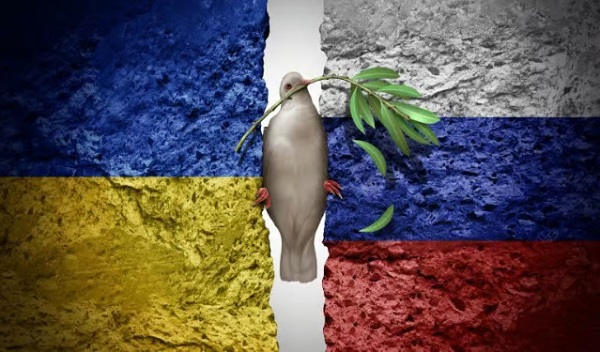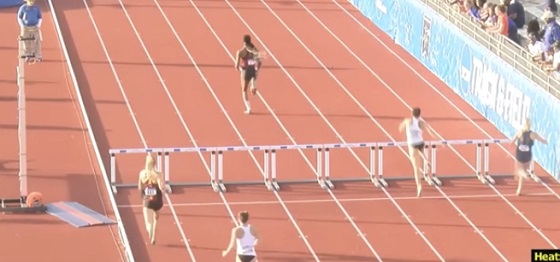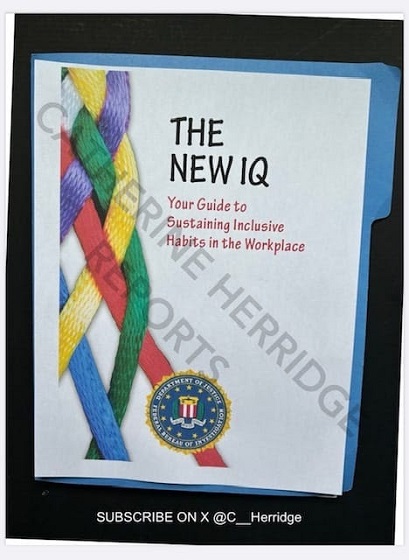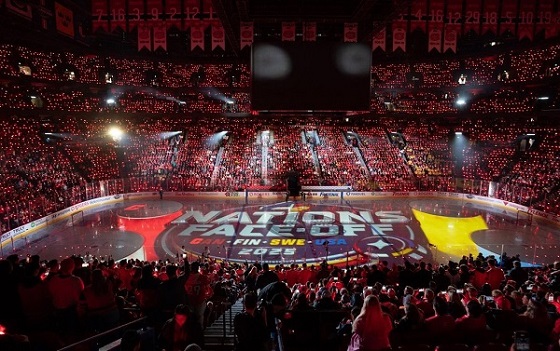Bruce Dowbiggin
Do It Once, Shame On You; Do It Twice, Shame On Me
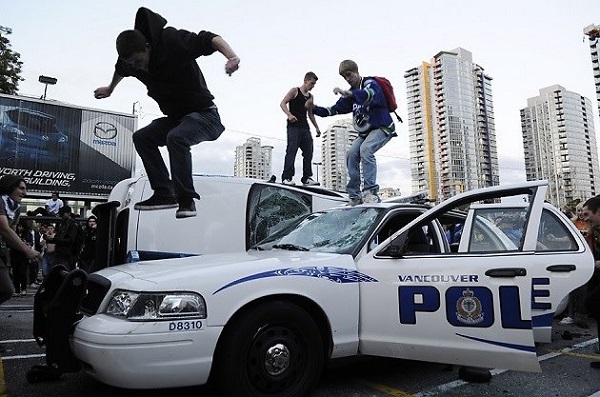
Now that the annoying Toronto Maple Leafs business (In Toronto The Leafs Always Fall In Spring ) is in the rearview mirror it’s time to turn Canada’s yearning eyes to… the Vancouver Canucks? Okay, the Edmonton Oilers are in the second round, too, playing the Canucks. But it’s the unlikely re-appearance of the Nucks, like some Ogopogo on skates, that commands the curious attention of Canadians.
While Edmonton may even win the Cup this year— should its forward-heavy strategy work better than it did for the Maple Leafs— seeing the team in blue and green re-emerge after eight seasons out of eleven with no playoffs— no postseason since 2020— has some intriguing side stories. It’s been bleak since the owner blew up his team in 2013 for fear of losing a few season-ticket holders.
Vancouver is the only Canadian team to go to Game 7 twice in the Finals since Montreal won the Cup in 1993. In 1994 it was defeat at the hands of Mark Messier and the Rangers. In 2011 it was the bastard, er… Boston Bruins who skated away with the Cup in seven. And, as everyone at HNIC reminds us, Calgary (2004), Edmonton (2006), Ottawa (2007) and Montreal (2021) all fell in the Final, too. But that’s it. Seven spins of the Plinko in 31 years.
With NHL ensuring that only one of the two remaining Canadian clubs will advance after this round, the chances of a Canadian team making it eight Finals in 31 years are slim. So why not the team that plays at 10 PM ET all the time, the team that was predicted to be among the League’s worst this year. Your Vancouver Canucks. After all, it would be so perfect for the team from the home of loony politics to win the Cup.
Primary among them is the symmetry of the Hamas disturbances across the county today that recall the 2011 Canucks riot that followed the Game Seven loss by Alain Vigneault’s team. For those who don’t remember, the bitter loss fused overly refreshed Canucks fans with an element that had nothing to do with hockey on a warm summer night.

As the fans streamed away from the Rogers Centre and the open-air watch parties, the now-familiar masked balaclava-wearing, backpack toting radicals moved among them, whipping up the fans’ monumental disappointment with urges to vandalize and loot. Viewers saw an incongruous picture of these fifth columnists and fans in the team jersey becoming involved in the smashing of windows and setting of fires. Sure, Montreal had seen recent riots after Stanley Cups but there was little element of politics in the drunken behaviour.
Not Vancouver. Not in 2011. Seeing the random anarchists and looters on Granville and Robson Streets the question was, “Why were the cops and elected officials so unprepared?”

It was an unsettling conclusion to a season of so much good feeling in Vancouver, staining the memory of a gifted hockey team that simply ran out of healthy bodies. The most common reaction to the riots was “Who were those non-hockey people in the riot?” There were jokes about the instigators were 257 Daniel Sedins, 319 Henrik Sedins and 195 Roberto Luongos. But they fell flat.
Many were shocked to see so many anarchists, Marxists, radical climate freaks, petty criminals and psychopaths in their midst. Like the reaction to the Palestinian mobs waving Death To Jews and From The River to the Sea, the impact on average Canadians— the kind who watch hockey, not Mao, as a religion— was unsettling. The damages soared into the tens of millions as Vancouver’s looked at a burned-out downtown and asked, “What happened?”
Later investigations revealed a large contingent of the rioters came from as far away as the Pacific Northwest and California. This was an organized event. Again, how did so many people with evil intent get into the country? The answer to most of the questions was very Canadian. People thought it couldn’t happen here.
It’s what most are saying about the Hamas-inspired wave of crime and insubordination now on screens. Canadians have always been so liberal and self effacing. How did they end up branded by homicidal Hamas as supporting the murder of babies? Isn’t there supposed to be some pay-off for being kind and opening the doors to unchecked immigration from countries where terror and instability are the watchwords?

What is just as unnerving about the Palestinian intifada ugliness is the realization that, memories of 2011, the anti-Israel demonstrators represent only a part of the mobs denying entry to Jewish students at schools or blocking traffic or defacing buildings with messages of hate. It’s clear that anti-capitalist nihilists are in equal numbers in the crowds, whipping up hapless coeds, grad-school nimrods and nutty professors with their messages.
Worse, the uniform tents, signs, chants and more across the continent are the products of donors linked to some of the most famous names in finance— Rockefeller, Gates, Soros.
Citizens are right to wonder how the toxic politics of the Middle East has fused with a bottomless pit of money to upend their capitalist society. And to realize that the liberal tenets of toleration and friendliness espoused by feckless politicians have only brought on this crisis.
And to think that most thought it all behind them after they’d cleaned up the broken glass and burned cars in 2011. As they say, do it once, shame on you. Do it twice, shame on me.
Bruce Dowbiggin @dowbboy is the editor of Not The Public Broadcaster A two-time winner of the Gemini Award as Canada’s top television sports broadcaster, he’s a regular contributor to Sirius XM Canada Talks Ch. 167. Now for pre-order, new from the team of Evan & Bruce Dowbiggin . Deal With It: The Trades That Stunned The NHL & Changed Hockey. From Espo to Boston in 1967 to Gretz in L.A. in 1988 to Patrick Roy leaving Montreal in 1995, the stories behind the story. Launching in paperback and Kindle on #Amazon this week. Destined to be a hockey best seller. https://www.amazon.ca/Deal-Trades-Stunned-Changed-Hockey-ebook/dp/B0D236NB35/
2025 Federal Election
Chinese Gangs Dominate Canada: Why Will Voters Give Liberals Another Term?

There’s an old joke that goes, the Japanese want to buy Vancouver but the Chinese aren’t selling. Glib, yes. But with enough truth— Chinese own an estimated 30 percent of Vancouver’s real estate market— to pack a punch; Especially in this truncated rush to anoint Mark Carney PM before anyone finds out exactly who’s his Mama.
The advertised narrative for this election is Donald Trump’s vote of no confidence in the modern Canadian state. A segment of Canadians— mostly Boomers— see this as intolerable foreign interference in the country’s sovereignty. So rather than look inward at why Canada’s closest partner is fed up with them the Liberal government has chosen a pep rally rathe than any uncomfortable questions.
Namely about Chinese interference in Canada’s politics, the distortion of real-estate prices in Canadian urban markets, the exploitation of banking and the thriving drug trade that underpins it all. And how it’s driving a wedge between generations in the nation. As we like to say, Canada’s contented elites have been sitting in first class for decades but only paying economy.
They’d like you to forget insinuations that Canada is a global money-laundering capital. Better to blame Trump for the “willful blindness” that has Americans and others losing trust in Canada to keep secrets and contribute its fair share tom protecting against the growth of China. (The same geopolitical concern that saw Trump kick the Chinese out of the Panama Canal Zone.)
Thanks to the diligent reporting of journalist Sam Cooper and others we know better. And it’s ugly. An estimated trillion dollars from Chinese organized crime has washed through Canada since the 1990s. They’ve used underground banks and illegal currency smuggling to circumvent the law. They’ve bribed and intimidated. And they’ve poisoned elections.
This penetration of the culture/ economy by well-organized Asian criminal gangs have been around since the 1990s, but under Trudeau they hit warp speed. By the time Trump inconveniently raised the issue of border security in January, Canada’s economy could fairly be characterized as a real-estate bubble with a drug-money-laundering chaser. The Chinese Communist Party now operates “police stations” in many Canadian cities to supervise this activity and report to Beijing.

In his 2021 book Willful Blindness (and subsequent reporting) Cooper patiently records this evolution with brazen Asian gangs using casinos in BC and Ontario as money-laundering outlets to wash drug money and other criminal proceeds, turning stacks of dirty twenty-dollar bills into clean hundred-dollar bills or casino chips. (When Covid closed the casinos they used luxury mansions as private casinos.)
All financed by underground banks and loansharks. This process became known internationally as The “Vancouver Model” to help establish Chinese proxies overseas and extend the CPP ‘s reach. Hey, the real estate kingpin is named Kash-Ing. (Kaching!) It’s currently being used to buy farm properties in PEI, much to the anger of residents (who will still vote Liberal to protect their perks.)
While investigators and some authorities attempted to expose the schemes the perps were protected by compromised government officials, corrupt casino employees and the inability of courts to deliver justice. It’s why Canadians were so shocked that TD Bank was fined $3B in the U.S. for allowing money laundering. “Not us! No way! We’re Simon pure”.
Much of this money ended up in Canada’s feverish real-estate market, with vacant properties creating insane price spirals across the nation. It’s driven the inability of under 40s to buy homes— another major crisis the Liberals are trying to disguise under Mark Carney the compliant banker. Still more of the proceeds were used to build stronger drug-supply chains between Asia, Mexico and Canada— with heroin and fentanyl then distributed to the U.S. and in Canada.

Against this explosion of housing and drug debt were stories of the political influence of these gangs into the Canadian system. The sitting Canadian prime minister, who praised the Chinese form of governing before he reached the PM post, has been seen in photos with underground Asian gang figures. As were previous Liberal leaders like Jean Chretien who made no secret of his lust for the Chinese market. Chinese money was used to build extensively in Chretien’s Shawinigan riding.
Donations to Trudeau’s Montreal riding association and to the Trudeau Foundation were favourites of shadowy Chinese figures. “In just two days (in 2016), the prime minister’s (Outremont) riding received $70,000 from donors of Chinese origin, and at the same time, the government authorized the establishment of a Chinese bank in Canada,” Bloc leader Yves-Francois Blanchet said on Feb. 28.
Donations to Trudeau from all across Canada constituted up to 80 percent of the riding’s contributions that year. In May 2016, one such fundraiser saw Trudeau hosted by Benson Wong, chair of the Chinese Business Chamber of Commerce, along with 32 other wealthy guests in a pay-for-access event. The patterns exposed by Cooper finally prompted a commission by Quebec justice Marie-Josée Hogue looking into Chines interference in Trudeau’s successful 2019 and 2021 elections.

An interim report released last year by Hogue determined that while foreign interference might not have changed the outcome of Canada’s 2019 and 2021 federal elections, it did undermine the rights of Canadian voters because it “tainted the process” and eroded public trust. So petrified was Trudeau of the full Hogue Report that he prorogued parliament for three months and handed in his resignation rather than test his 22 percent approval rating in a Canadian election. Or his luck with the courts.
Luckily for Liberals Trump came along to smoke out Trudeau and allow for the current whitewash of the party’s record since 2015 under Carney. So instead of agreeing with Washington about Canada’s corrupted economy Canadians have decided to engage in a Mike Myers nostalgia fest for a nation long gone. A nation overly dominated by its smug, satisfied +60 demographic that sits back on its savings while younger Canadians cannot get into the economy.
Reaching past the sunset media to those people is Pierre Poilievre’s task. He has a month to do so. For Canada’s long-term prospects he’d better succeed. The Chinese are watching closely.
Bruce Dowbiggin @dowbboy is the editor of Not The Public Broadcaster A two-time winner of the Gemini Award as Canada’s top television sports broadcaster, his new book Deal With It: The Trades That Stunned The NHL And Changed hockey is now available on Amazon. Inexact Science: The Six Most Compelling Draft Years In NHL History, his previous book with his son Evan, was voted the seventh-best professional hockey book of all time by bookauthority.org . His 2004 book Money Players was voted sixth best on the same list, and is available via brucedowbigginbooks.ca.
Bruce Dowbiggin
From Heel To Hero: George Foreman’s Uniquely American Story
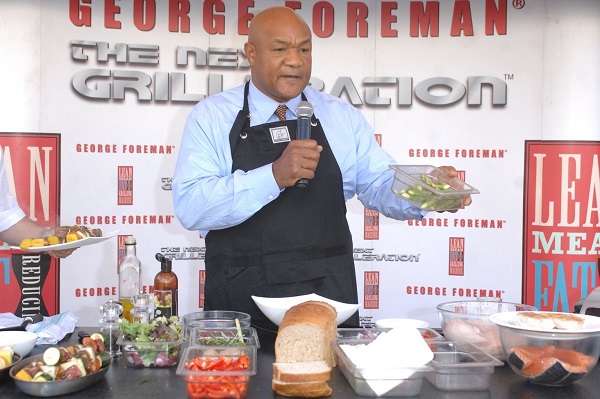
“The more you learn, the more you realize how much you don’t know.”— George Foreman
For those who thought Donald Trump’s role progression (in WWE terms) from face to heel to face again was remarkable, George Foreman had already written the media book on going from the Baddest Man in the World to Gentle Giant.
It’s hard for those who saw him as the genial Grill Master or the smiling man with seven sons all named George (he also had seven daughters, each named differently) to conjure up the Foreman of the 1970s. He emerged as a star at the 1968 Olympics, winning the gold medal in heavyweight boxing. His destruction of a veteran Soviet fighter made him a political hero. In an age that already boasted a remarkable heavyweights Foreman was something unique.
Muhammad Ali, Joe Frazier, Ken Norton, Ron Lyle and Jimmy Ellis were still bankable household names for boxing fans— but on the downside of famous careers. They each had their niche. Foreman was something altogether different. Violent and pitiless in the ring. Unsmiling as he dismantled the boxers he met on his way to the top. He was the ultimate black hat.
With the inimitable Howard Cosell as his background track , he entered the ring in 1973 against the favoured ex-champ Frazier, coming off his three epic fights with Ali. While everyone gave Foreman a chance it was thought that the indomitable Frazier, possessor of a lethal left hook, would tame the young bull.

Instead, in under two rounds of savagery , Foreman sent Frazier to the canvas six times. Cosell yelled himself horse crying, “Down goes Frazier! Down goes Frazier!” This was a whole new level of brutality as the poker-faced Foreman returned to his corner as the most feared boxer on the planet. For good measure Foreman destroyed Norton in 1974.
Fans of Ali quaked when they heard that he would face Foreman’s awesome power in Africa in the summer of 1974. They knew how much the trio of Frazier brawls had taken from him. The prospect of seeing the beloved heavyweight champ lifted off his feet by Foreman’s power left them sick to their stomach. Foreman played up his bad-boy image, wearing black leather, snarling at the press and leading a German shepherd on a leash.
Everyone knows what happened next. We were travelling the time in the era before internet/ cell phones. Anticipating the worst we blinked hard at the headline showing the next day that it was a thoroughly exhausted Foreman who crumbled in the seventh round. The brilliant documentary When We Were Kings is the historical record of that night/ morning in Kinshasa. The cultural clash of Ali, the world’s most famous man, and the brute against the background of music and third-world politics made it an Oscar winner.
But it’s largely about Ali. It doesn’t do justice to the enormity of Foreman’s collapse. Of course the humiliation of that night sent Foreman on a spiritual quest to find himself, a quest that took the prime of his career from him. It wasn’t till 1987 that he re-emerged as a Baptist minister/ boxer. With peace in his soul he climbed the ranks again, defiantly trading blows in the centre of the ring with opponents who finally succumbed to his “old-man” power.
Instead of the dour character who was felled by Ali, this Foreman was transformed in the public’s eye when he captured the heavyweight title in 1994, beating Michael Moore, a man 20 years his junior. He smiled. He teased Cosell and other media types. He fought till he was 48, although he tried to comeback when he was 55 (his wife intervened)

And, yes, for anyone who stayed up late watching TV there was the George Foreman Grill, a pitchman’s delight that earned him more money than his boxing career. HBO boxing commentator Larry Merchant commented that “There was a transformation from a young, hard character who felt a heavyweight champion should carry himself with menace to a very affectionate personality.”
There was a short-lived TV show called George. There was The Masked Singer as “Venus Fly Trap”. And there were the cameos on Home Improvement, King Of The Hill and Fast ’N Loud, delighting audiences who’d once reviled him. He cracked up Johnny Carson.
Foreman’s rebound story was uniquely American. Where Canadians are enthusiastically damning Bobby Orr and Wayne Gretzky for political reasons, Foreman never became a captive of angry radicals or corporate America. He went his own way, thumping the bible and the grill. Rest easy, big man.
Bruce Dowbiggin @dowbboy is the editor of Not The Public Broadcaster A two-time winner of the Gemini Award as Canada’s top television sports broadcaster, his new book Deal With It: The Trades That Stunned The NHL And Changed hockey is now available on Amazon. Inexact Science: The Six Most Compelling Draft Years In NHL History, his previous book with his son Evan, was voted the seventh-best professional hockey book of all time by bookauthority.org . His 2004 book Money Players was voted sixth best on the same list, and is available via brucedowbigginbooks.ca.
-
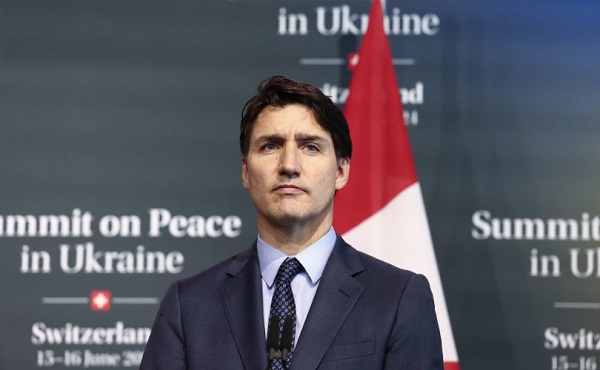
 Justice2 days ago
Justice2 days agoDemocracy watchdog calls for impartial prosecution of Justin Trudeau
-

 2025 Federal Election1 day ago
2025 Federal Election1 day agoPoilievre refuses to bash Trump via trick question, says it’s possible to work with him and be ‘firm’
-

 Business2 days ago
Business2 days agoPublicity Kills DEI: A Free Speech Solution to Woke Companies
-
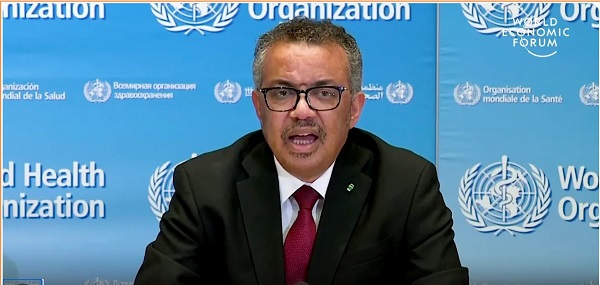
 Dr. Robert Malone2 days ago
Dr. Robert Malone2 days agoWHO and G20 Exaggerate the Risk and Economic Impact of Outbreaks
-

 2025 Federal Election1 day ago
2025 Federal Election1 day agoVoters should remember Canada has other problems beyond Trump’s tariffs
-
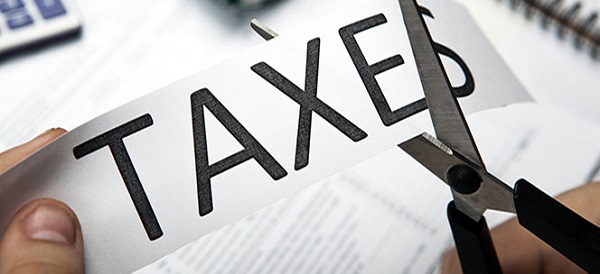
 2025 Federal Election1 day ago
2025 Federal Election1 day agoPoilievre to let working seniors keep more of their money
-

 2025 Federal Election2 days ago
2025 Federal Election2 days agoCanadian officials warn Communist China ‘highly likely’ to interfere in 2025 election
-

 COVID-191 day ago
COVID-191 day ago17-year-old died after taking COVID shot, but Ontario judge denies his family’s liability claim


